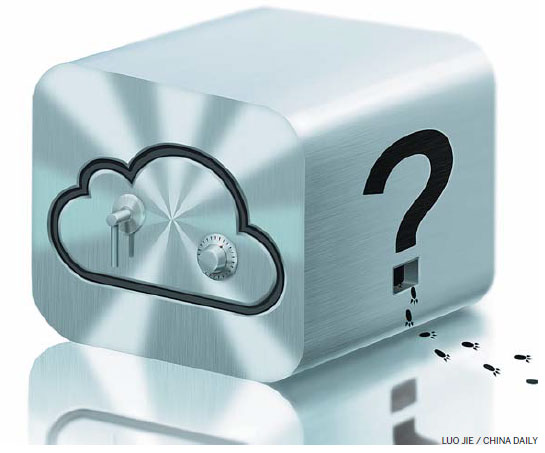 |
|
Computer science students participate in an online security contest for vocational schools in Nanjing, Jiangsu province, on June 18. Chen Yihuan / Xinhua |
Hacking of celebrities' accounts has brought home the risks of letting others store your information, Cao Yin and Gao Yuan report.
Following the leaks of nude photos of celebrities after their iCloud accounts were hacked, Zhou Wei is reluctant to use Apple's cloud-based storage service.
"I prefer to store all my information on a mobile hard disk drive rather than use iCloud, although the latter is more advanced and convenient," said the 26-year-old, who works for a Beijing self-media company.
Zhou regularly backs up anything she wants to keep on mobile hard disks because she does not fully trust her account number and password in the big data space.
Qi Xiangdong, president of Qihoo 360, China's largest cyber security service provider, said the issue has drawn lots of attention in China "because online security and privacy protection have much to do with State security".
Qi, along with several Web security specialists, wants China's legislature to put a personal information protection law on its agenda. Such a law should clarify what kind of online data should be protected, as well as the obligations of big data companies to boost the industry's self-discipline.
Following the recent hacking of celebrities' iCloud accounts, Apple CEO Tim Cook promised better security features to prevent similar leaks in the future.
Potential risks
Ning Jiajun, a senior researcher with the advisory committee for State Informatization, a government think tank, said "the cloud makes people's lives easier as well as enlarges memory space online".
It is thanks to cloud technology that smartphone users can check a bus schedule using an app, for instance. He said some of people's concerns about online security can be attributed to irresponsible company behavior.
"There are reports that some companies have purchased private information in our country for their own gain. What's worse, they are hardly punished because of the lack of rules and laws on privacy protection."
He said until such regulations are introduced privacy relies on the self-discipline of the companies and the supervision of industry associations.
Liu Xiaohang, 25, an employee of a finance company in Beijing, uses cloud data storage but not for personal stuff.
"I put my documents on a cloud, so I can share them with my clients. It's convenient, but I won't store my personal information this way," Liu said.
"I was plagued by cold callers and spam e-mails after I left some information on websites in the past. I don't want to take the chance again," he added.
Qi said that big data is a double-edged sword. Although it offers convenience, it also comes with risks.
The popularity of cloud-based products for storing information, not only of individual users but also enterprises or government agencies, means there could be severe consequences if accounts are hacked and sensitive information stolen.

